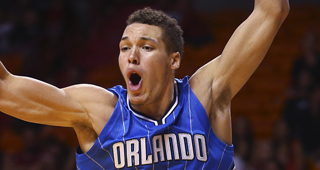Shortly after the 15-16 season ended, the Orlando Magic began the process of moving back towards the playoffs for the first time since 2012 when they traded Dwight Howard away. Unfortunately, the 16-17 season ended with their fourth straight trip to the lottery.
Things started off optimistically enough, as Orlando fired Scott Skiles and replaced him with Frank Vogel. After five and a half years, the Pacers moved on from Vogel to bring in a fresh voice in Nate McMillan. The hope was Vogel’s track record of success would bring a winner back to Central Florida.
With a new, defensive-minded coach in the fold, Orlando moved towards giving him a defensive-minded roster he could work with. At the 2016 NBA Draft, the Magic traded Victor Oladipo (once seen a franchise cornerstone), Ersan Ilyasova (who had no future in Orlando), and the 11th overall pick in the draft to the Oklahoma City Thunder for Serge Ibaka. Never mind the fact that Orlando had a blossoming young player at power forward already in Aaron Gordon, the Magic now had a player they hoped would be the backbone of Vogel’s defense.
Orlando then traded a future second round pick to the Detroit Pistons for Jodie Meeks to help shore up some shooting deficiencies. Those two trades were just the first in an avalanche of moves to come.
With Oladipo off to the Thunder, the Magic had cleared up the logjam at shooting guard and signaled their intentions to move forward with Evan Fournier as the player of choice at that position. Fournier signed a five-year, $85 million dollar deal, which was seen as somewhat of a steal for Orlando, given the way money was flying around last summer. Fournier even commented that he never took any other meetings or calls, because Orlando was where he wanted to be. Had the trades and that signing been surrounded by some veteran fillers, the Magic might have had a decent offseason for a rebuilding squad.
Alas, General Manager Rob Hennigan pushed all his chips to the middle of the table and doubled-down up and down the roster. He signed Bismack Biyombo, who was a career backup minus a strong starting stretch for the Toronto Raptors, to a four-year, $68 million dollar contract. This was despite the presence of Nikola Vucevic, long thought to be one of the NBA’s better bargains, already on the roster.
Then, in moves meant to strengthen the bench, the Magic signed D.J. Augustin to a four-year, $29 million deal, despite him having flamed out in both Oklahoma City and Detroit in recent seasons, to back up Elfrid Payton. Then, in an overpay, Orlando gave Jeff Green $18 million for one year to back up both forward spots.
To help clear space for all the spending, Orlando let every other free agent walk and salary dumped Shabazz Napier on the Portland Trail Blazers. And they also traded Devyn Marble to the Los Angeles Clippers to take a low-cost flyer on C.J. Wilcox. In the span of about two weeks, the Magic had gone from a rebuilding team to one that looked like it could potentially challenge for the playoffs.
Once the season started, all the potential issues with the roster came to light. In an increasingly downsizing league, the Magic had chosen to go really big. Gordon was forced to play small forward, where all of his advantages as a power forward, namely his speed and quickness of the dribble, are negated. The team predictably struggled to space the floor on offense, as the best shooter was Ibaka. The lack of shooting caused the offense to sputter and the defense, once hoped to be elite, struggled to gain the foothold the team had hoped for.
The new editions also had a lasting effect on team chemistry. Prior to the season, Vucevic talked about how much starting at center meant to him and how he felt he had earned that right. Instead he found himself competing with Biyombo and spent a long, unproductive stretch coming off the bench. Payton, once the jewel of the organization’s eye at point guard, was benched for Augustin when the team needed shooting around the mid-point of the year.
Only Ibaka, Gordon and Fournier maintained their starting spots throughout the season, but all had struggles. Orlando quickly realized that Ibaka wasn’t the player they had hoped for, as his defense slipped noticeably and his once athletic offensive game had become confined to shooting mostly jump shots. Gordon struggled on both ends as a small forward and never seemed comfortable spending all his time on the perimeter. And with a lack of room to move, Fournier was unable to create his own shot or make plays for other. To put it simply, the offense was awful and languished near the bottom of the NBA all season.
With Ibaka not proving to be the answer and looking at a lucrative contract as a free agent this summer, Orlando cut their losses and moved on at the Trade Deadline. They picked up Terrence Ross and an additional first round pick. Many panned the move as selling off Oladipo and a lottery pick for a lesser player and lesser pick, but moves can’t really be chained together like that. The addition of Ross gave the Magic better balance on offense almost immediately, but most importantly Gordon was able to move back to power forward and has looked like the player everyone liked from a year ago since the deadline.
This offseason, Orlando should have plenty of cap space to make moves. They’ll also have a high lottery pick and another pick in the mid-20s. They’ll almost assuredly move on from Jeff Green, as his price tag versus production is more than a rebuilding team can swallow. Meeks is the team’s other free agent and when healthy, which hasn’t been often, he’s provided the shooting the team sorely lacks. He could return if the cost doesn’t prove prohibitive.
Most of all, Orlando has to nail their draft pick. Payton, despite finishing the season strong for a second straight year, is starting to show signs of being a “good stats, bad team” guy. He still doesn’t shoot it well enough (under 27% from behind the arc this year) and for a non-shooting point guard to lead a team, he has to be elite in other areas. At this point, it is unclear if Payton is that or not, but signs are pointing towards he isn’t. That means the Magic could be in line for a new point guard. This draft is heavy in good options. If the ping pong balls bounce the right way for Orlando, which they have three other times in history, they could pick Markelle Fultz or Lonzo Ball. If not, they’ll still have a shot at Dennis Smith or De’Aaron Fox. No matter what, the opportunity is there to improve
With the later pick, Orlando can target a shooter, as Ross and Fournier are still the only real threats from the outside on the roster, pending Meeks’ return. At this point, the Magic are back in the talent collection phase and need to be conscious of just adding talent to the roster with their later picks and letting positions sort themselves out down the line.
The real question is: who will be making those picks? As was widely expected, Hennigan was fired immediately after the season. Rumors have run rampant of who the Magic will consider for the General Manager position, but no one has emerged as an overly clear contender. For now, Matt Lloyd, who was an assistant GM to Hennigan, is serving as the interim GM. Some think Orlando is dreaming of bringing Doc Rivers back to the area where he still has a home as the GM, should be he be relieved of his duties with the Clippers. Another rumored candidate is Pat Garrity, who currently works under Stan Van Gundy in the Detroit Pistons front office. At this point, it is expected that the Magic will consider several options before making a decision on who will lead the basketball operations going forward.
The challenge facing Orlando is relevancy. No team in the NBA is as irrelevant as the Magic are right now. Other bad teams have either a boatload of young talent, history, are in a major market or some combination of the three. Orlando has Gordon and not much else, and even his development had stagnated from playing out of position for most of the year. The other players on the roster are nice enough, but are all best suited to be role players on a good team, as opposed to leading men.
History isn’t a factor for Orlando and they are still in one of the smaller markets in the NBA. The weather and lack of state taxes are nice, but those are sweeteners, not reasons free agents will pick a team. In addition, the Magic are running the risk of becoming the second most popular team in town, behind Orlando City Soccer. That is why a little lottery luck and making a smart pick could go a long way towards getting folks re-interested in The City Beautiful. Otherwise, who knows how long the playoff drought might stretch? And unlike some of their peers at the top of the lottery, Orlando can’t survive a very long stay there.
Offseason Details
Guaranteed Contracts (8): D.J. Augustin, Bismack Biyombo, Evan Fournier, Aaron Gordon, Mario Hezonja, Elfrid Payton, Terrence Ross, Nikola Vucevic
Partial/Non-Guaranteed Contracts (4): Patricio Garino, Marcus Georges-Hunt, C.J. Watson, Stephen Zimmerman
Potential Free Agents (3): Jeff Green (UFA), Jodie Meeks (UFA), Damjan Rudez (RFA)
“Dead” Money on Cap (0): None
First Round Draft Pick(s) (as of 4/11/17): Pick #5, Pick #25
Maximum Cap Space: $19,822,460
Projected Cap Space: $13,021,687




